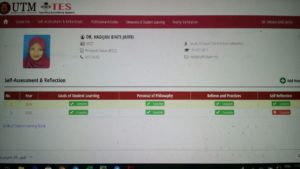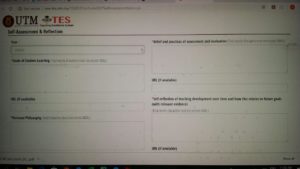In your Professional Activities heading (once you click this heading), there will appear 1) Number of Credit Taught, 2) Attendance in Teaching and Learning Training, and 3) Implementation of nonconventional T&L.
For 1) Number of Credit Taught and 2) Attendance in Teaching and Learning Training, it would be generated automatically based on your AIMS and GSMS (for Number of Credit Taught) and UTMSmart attendance (based on the workshop or anything that you attend). You CANNOT add anything here.
For Implementation of nonconventional T&L, it relates to any teaching strategies that you implement in your class other than lecture (lecture is considered as conventional T&L). On top of that, if you share your experience with others of your teaching strategies, you can put that under Workshop (and include your Workshop evidences in terms of invitation letter for the workshop etc.) but it has to be related to one teaching strategy that you implement. You have to make sure
a) One course has to show one teaching strategy that you are really good at
b) Strategy evidence is based on a report of what you implement in class (should include testimony, students grade, certificate of blended learning, example of activity worksheet etc.)
c) All of your courses have evidences of your teaching strategy
In my example, since Remote Supervision is similar to MPPU1024 (Research Methodology in Education) and MPPU1070 and its code does not appear in this Professional Activities section, I select any available course which is similar to Remote Supervision (based on teaching approach). In this example, I selected MPPU1024. So, I will upload any relevant evidences such as a scanned copy of student attendance, URL link that show I conducted the Remote Supervision course and such.
NOTE: If you want to know more about how to complete your TESDCP, go to the following link
- Getting Started
- Course File
- Self-Assessment & Reflections,
- Measures of Student Learning and
- Yearly Validation.


